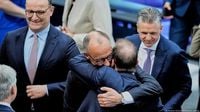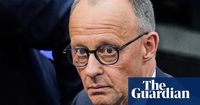Friedrich Merz is now the Chancellor of Germany after a dramatic day in the Bundestag that saw him initially fail to secure enough votes in the first round of voting. On Tuesday, May 6, 2025, Merz, the leader of the conservative Christian Democratic Union (CDU), received 310 votes in the morning session, falling six votes short of the 316 needed for an absolute majority. This was an unprecedented event in Germany's postwar history, marking the first time a candidate for chancellor failed to win a majority in the first round.
Despite the setback, Merz returned to the Bundestag later that afternoon for a second round of voting, where he successfully garnered 325 votes in favor of his chancellorship, with 289 against and one abstention. This decisive victory came after a coalition agreement was signed the previous day between the CDU/CSU alliance and the Social Democratic Party (SPD), which collectively holds 328 seats in the Bundestag.
In the first round, 621 of the 630 deputies voted, with 310 supporting Merz and 307 opposing him, alongside one spoiled vote and three abstentions. The failure to achieve a majority in the first round surprised many, including Merz himself, who had expressed confidence before the vote. "We have the votes to elect the chancellor," he stated alongside SPD leader Lars Klingbeil before the initial vote.
Following his election, Merz was officially appointed by President Frank-Walter Steinmeier at Bellevue Palace. Steinmeier congratulated him, saying, "Mr. Chancellor, slightly late, but all the more heartfelt, congratulations on your election and, from me, I wish you every success in everything that lies ahead." Merz's cabinet, which includes a total of 17 ministers, is expected to be sworn in shortly.
Merz's political journey has been long and fraught with challenges. Having previously lost multiple leadership contests within the CDU, he finally secured the party's nomination earlier this year. His campaign focused on revitalizing Germany's economy, supporting Ukraine in its defense against Russian aggression, and reasserting Germany's influence in Europe.
International reactions to Merz's election have been swift. French President Emmanuel Macron expressed optimism about strengthening Franco-German relations under Merz's leadership, emphasizing the importance of collaboration between Paris and Berlin for European stability. Macron stated, "It's up to us to speed up our European agenda of sovereignty, security, and competitiveness." Merz is scheduled to meet with Macron and Polish Prime Minister Donald Tusk on Wednesday.
Ukrainian President Volodymyr Zelenskyy was also quick to congratulate Merz, expressing hope that Germany would take a stronger leadership role in European and transatlantic affairs. Zelenskyy noted, "This is especially important with the future of Europe at stake — and it will depend on our unity." Merz has shown support for Ukraine, indicating a willingness to provide German Taurus missiles to aid in their defense, contingent on coordination with European partners.
The far-right Alternative for Germany (AfD) party took advantage of the political turmoil, with co-leader Tino Chrupalla asserting that Merz's failure in the first round highlighted the fragile nature of the coalition. He stated, "The weak foundation on which the small coalition between the CDU-CSU and the SPD was built was defeated by the citizens." The AfD has been vocal in calling for fresh elections, asserting that Merz's government is inherently unstable.
In contrast, the Left Party (Die Linke) viewed the initial vote as a lack of confidence in Merz. Party leader Jan van Aken remarked, "If he doesn't even have the trust of his own people, how will he win the trust of the people who struggle with real everyday problems?" This sentiment reflects concerns about Merz's ability to govern effectively given the evident divisions within his coalition.
As Merz prepares for his first international trips, including visits to Paris and Warsaw, he faces the challenge of uniting a coalition that has already shown signs of internal dissent. The CDU/CSU and SPD's coalition agreement, while providing a numerical majority, is now under scrutiny following the unexpected vote outcomes.
Looking ahead, the political landscape in Germany remains volatile. The AfD's rising popularity, partly fueled by dissatisfaction with mainstream parties, poses a significant challenge to the stability of the current coalition. Observers note that any further gains by the AfD could undermine efforts to keep the party marginalized in German politics.
In summary, Friedrich Merz's ascension to the chancellorship marks a significant moment in German politics, characterized by a tumultuous voting process that laid bare the vulnerabilities of the governing coalition. As he embarks on his tenure, the eyes of both Germany and Europe will be watching closely to see how he navigates the challenges ahead.






